Scratch Longsword Starfighter Original Design / Scratch Built
Scratch - Longsword Starfighter {Scratch}
Contributed by Todd Mullin
| Manufacturer: | Scratch |
Brief:
The concept was deceptively easy. Have as many of your online rocketry acquaintances as you can talk into it send you
a small box of parts. The parts would then be randomized and sent back. Then everyone's scratch building skills would
kick in and some of the coolest rockets ever seen would emerge! I was more than happy when EMRR liked my suggestion for
the contest and I jumped at the chance to administrate it. Many long hours of collecting sorting and packing parts
followed. I not only randomized the parts in each box, but randomized the boxes as well before blindly attaching
mailing labels to each. I opened my box of treasure, hoping for a one of a few boxes I had seen very promising parts go
into. I didn't get one of the boxes that I had been hoping for, but I got a good selection of parts. It took several
hours of noodling around with the parts to come up with two radically different ideas that I liked. I decided to
embrace what fate had left for me in my box. The two parts that were the driving force behind my design were the Estes
nosecone currently used by the Shuttle Express and a complete set of decals from the Estes Screamin' Eagle.
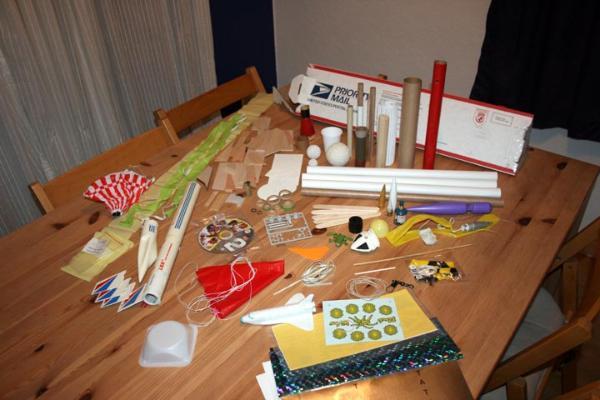
Construction:
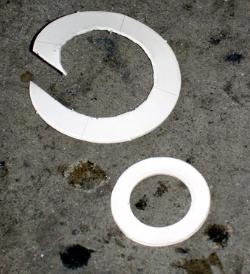 In my box of parts, I found several scratch and dent 18" lengths of BT-50, one of which was fairly
unscathed. This worked well as I wanted to use a 24mm motor for my main motor because of the good range of motors
available. I found a couple of cardboard centering rings that fit the 24mm tube, but they were much too large for any
other tube I had. I ended up trimming the outside of the rings to fit inside a 9" length of BT-60. I decided that
I liked the look of the two tubes together, but it needed some flash.
In my box of parts, I found several scratch and dent 18" lengths of BT-50, one of which was fairly
unscathed. This worked well as I wanted to use a 24mm motor for my main motor because of the good range of motors
available. I found a couple of cardboard centering rings that fit the 24mm tube, but they were much too large for any
other tube I had. I ended up trimming the outside of the rings to fit inside a 9" length of BT-60. I decided that
I liked the look of the two tubes together, but it needed some flash.
I had a balsa transition that fit the two tubes, but it just didn't look interesting enough coupling the tubes together with it. I was kit by a flash of inspiration and knew that I had to take a risk with the transition. I carefully cut the BT-50 end off and started carving out the center of the transition to make it into a tailcone. It took nearly an hour, but I ended up with a great looking tailcone to center the BT-50 inside the tail of the BT-60 with the cardboard centering ring supporting the front.
I decided that I wanted to bevel the front of the BT-60 section to give it a more streamlined look. I turned to my computer and printed out a template using VCT. This is a handy little bit of freeware that can be downloaded at http://myweb.cableone.net/cjcrowell/vcpmain.htm . It allows the user to create several different types of handy patterns to give your rockets much more Zing! I traced the pattern onto the tube and carefully cut it with a new xacto blade.
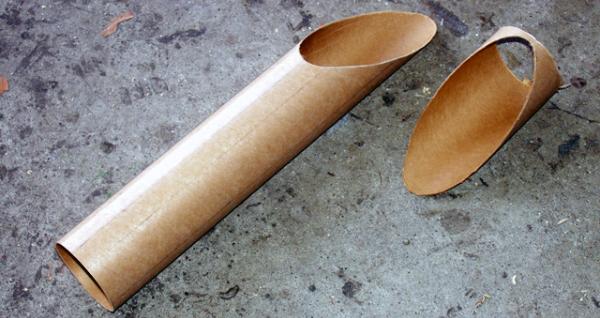
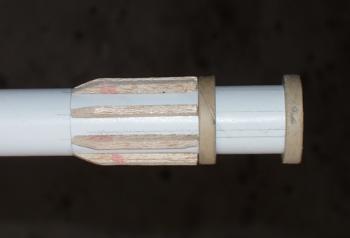 Next, I turned to the front of the rocket. I had a couple of small sections of BT-55 that fit the
starfighter style nosecone. I settled on the longest length (8") to give the rocket a long, sleek look (and
hopefully added stability without too much nose weight). I had a couple of very loose fitting 1/4" centering rings
to transition the BT-55 to the front of the BT-50. I attached a length of Kevlar®
shock cord into the rings before gluing the tubes in place. Still the transition was a bit blah. I decided to add ribs
at the transition to give it a bit more interest. I trimmed eight 1/8"x1/8"x2" sticks from scrap balsa
in my box and cut one end of each with a 1/4" bevel. After gluing these in place, I was much more pleased with the
look!
Next, I turned to the front of the rocket. I had a couple of small sections of BT-55 that fit the
starfighter style nosecone. I settled on the longest length (8") to give the rocket a long, sleek look (and
hopefully added stability without too much nose weight). I had a couple of very loose fitting 1/4" centering rings
to transition the BT-55 to the front of the BT-50. I attached a length of Kevlar®
shock cord into the rings before gluing the tubes in place. Still the transition was a bit blah. I decided to add ribs
at the transition to give it a bit more interest. I trimmed eight 1/8"x1/8"x2" sticks from scrap balsa
in my box and cut one end of each with a 1/4" bevel. After gluing these in place, I was much more pleased with the
look!
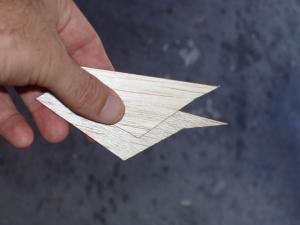 At
this point, I had a great looking airframe and absolutely no idea what to do for fins! I doodled around on some scratch
paper for a few days before noticing the beveling templates from the body tubes laying on my building table. I used the
curves of the templated to trace smooth graceful curves into the sharp angular fins I had roughed out. By splicing
together several small pieces of 1/8" balsa, I was able to create a large enough sheet to be able to cut out two
wings for the rocket.
At
this point, I had a great looking airframe and absolutely no idea what to do for fins! I doodled around on some scratch
paper for a few days before noticing the beveling templates from the body tubes laying on my building table. I used the
curves of the templated to trace smooth graceful curves into the sharp angular fins I had roughed out. By splicing
together several small pieces of 1/8" balsa, I was able to create a large enough sheet to be able to cut out two
wings for the rocket.
I scrounged through my box and came up with a couple of laser cut balsa fins that had the look of the tail fins I wanted. They had a root edge that tapered down, so I decided that I would mount them back far enough on the body so as to hang over the tailcone. A bit of sanding and they fit nicely. I trimmed the fins a bit, again using the curved template to give the tail fins a smooth curve to compliment the wings. After gluing them to the airframe, I decided to add a couple of toothpicks to the ends to give them a more finished look.
The rocket was coming together nicely, but still didn't have a complete look. I went back and started rooting around in the box looking for something to add to the "belly" of the starfighter. I settled on a long pointed BT-5 ramjet cone in a length of BT-5. This would allow me to add a second motor and get a small clustering bonus for the contest. After I glue the cone in and was test fitting the part, I decided that the assembly didn't quite blend in with the look of the rest of the rocket. I looked and found the only two BT-5 centering rings I had were for a BT-20. By putting the BT-5 inside a bevelled 4" section of BT-20, I had the look I was after.
 Finally, I did what I've always wanted to do to the nosecone. Since the first time I saw the Shuttle
Express cone years ago on another Estes design, the name of which I forget, I thought the indented curves needed to
have guns sticking out of them. In my box were a few toothpicks that came with some small grooved cut in one end of
each that I thought looked like sci-fi laser cannons. By drilling small holes into the cone, I was able to put the
"fighter" into the "starfighter" cone!
Finally, I did what I've always wanted to do to the nosecone. Since the first time I saw the Shuttle
Express cone years ago on another Estes design, the name of which I forget, I thought the indented curves needed to
have guns sticking out of them. In my box were a few toothpicks that came with some small grooved cut in one end of
each that I thought looked like sci-fi laser cannons. By drilling small holes into the cone, I was able to put the
"fighter" into the "starfighter" cone!
To complete construction, I tied a length of elastic shock cord to the Kevlar® one and tied the only two small 12" parachute I had on my box into the rocket.
Next, I turned to finishing. I filled all the tube spirals and wood with Elmer's Wood Putty that had been thinned with water. After this dried and was sanded, I coated the model with a heavy coat of Kilz spray primer. The trick I have discovered to using Kilz successfully is to be patient. After spraying, I wait until the next day to sand. Then the hard part! After sanding I wait a day to give the freshly exposed primer a chance to release whatever solvents are left in it before painting. In the past, I have gotten too excited to wait and the paint seems much more likely to "orange peel" when I don't allow the primer to breathe.

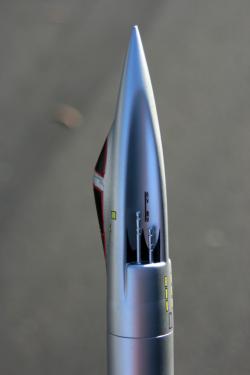 I originally thought I would paint the rocket grey so that it had the appearance of many of the fighter
jets in service today. The grey was okay, but not enough pop! After sanding down the grey, I sprayed the model silver.
Much better!
I originally thought I would paint the rocket grey so that it had the appearance of many of the fighter
jets in service today. The grey was okay, but not enough pop! After sanding down the grey, I sprayed the model silver.
Much better!
To complete the look, I used the set of Screamin' Eagle decals and then coated the Longsword with a coat of
Future floor polish to seal on the decals and give it a glossy finish.
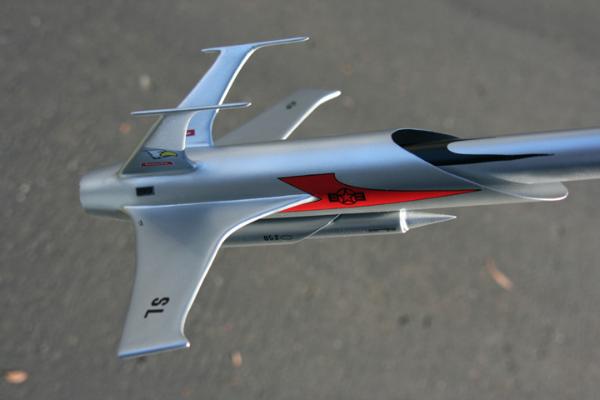

Flight:
I had gotten myself into a bid of a predicament with the flight of my design for the contest. Unwittingly, I had procrastinated into a 2 month dry spell wherein my club didn't have any launches scheduled! Luckily, a friend offered up his large horse property for a private launch.
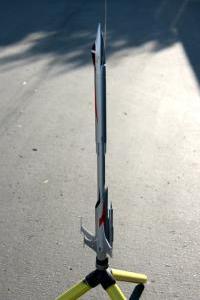
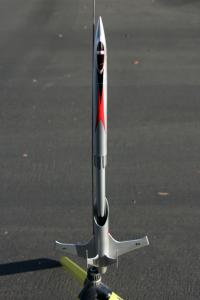
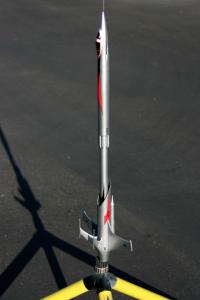
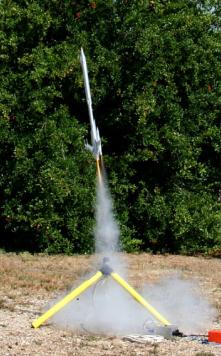 Having used the EMRR maximum liftoff
weight calculator I knew I should be okay to launch on a C11-3. With the added extra little bit of boost from the
13mm A10-PT I figured I should have a pretty good flight for the amount of area that I had to recover the rocket in.
Having used the EMRR maximum liftoff
weight calculator I knew I should be okay to launch on a C11-3. With the added extra little bit of boost from the
13mm A10-PT I figured I should have a pretty good flight for the amount of area that I had to recover the rocket in.
I packed the 'chutes up and wrapped each in a square of Estes wadding as well as packing a couple of more squares down the throat of the body. It took a couple of wraps of masking tape to get the nosecone to fit tight enought to not be wobbly.
I didn't have extra centering rings to use as motor blocks, so I added a masking tape thrust ring to the tail of both motors and a spiral wrap to make sure they wouldn't eject instead of the parachute.
As the motors have a good deal of distance between them, I couldn't just twist the igniter leads together so I had to use a clip whip for the launch.
Both motors lit together and the Longsword shot off the pad and arched slightly into the breeze. At apogee, the parachutes ejected, but became tangled in the tips of the tail fins. Still, the tangled 'chutes gave the rocket enough drag to safely land on it's "belly" without any damage!
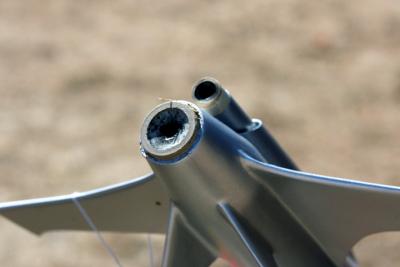
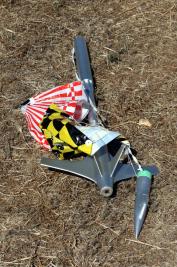
Summary:
I had a great deal of fun with this rocket design and contest. I liked the challenge of figuring out what to do when
you didn't have exactly the part you were looking for and couldn't just go buy it! I will definitely still build the
other design that I came up with from the remaining parts in my box.
The main con of the build was that not all of the parts in my box were in brand new condition. This however, forced me to be even more creative in my problem solving, for example, splicing together many small pieces of balsa to form a large enough sheet to cut my fins from.
 |
 |